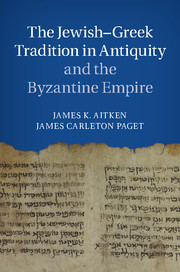The Jewish-Greek Tradition in Antiquity and the Byzantine Empire
Langue : Anglais
Coordonnateurs : Aitken James K., Carleton Paget James

This comprehensive survey of Jewish-Greek society's development examines the exchange of language and ideas in biblical translations, literature and archaeology.
The Jewish-Greek tradition represents an arguably distinctive strand of Judaism characterized by use of the Greek language and interest in Hellenism. This volume traces the Jewish encounter with Greek culture from the earliest points of contact in antiquity to the end of the Byzantine Empire. It honors Nicholas de Lange, whose distinguished work brought recognition to an undeservedly neglected field, in part by dispelling the common belief that Jewish-Greek culture largely disappeared after 100 CE. The authors examine literature, archaeology, and biblical translations, such as the Septuagint, in order to illustrate the substantial exchange of language and ideas. The Jewish-Greek Tradition in Antiquity and the Byzantine Empire demonstrates the enduring significance of the tradition and will be an essential handbook for anyone interested in Jewish studies, biblical studies, ancient and Byzantine history, or the Greek language.
Preface Amos Oz; 1. Introduction James K. Aitken and James N. Carleton Paget; Part I. History: 2. Jews and Greco-Roman culture: from Alexander to Theodosius II Günter Stemberger; 3. The Jewish experience in Byzantium Steven Bowman; 4. Jews and Jewish communities in the Balkans and the Aegean until the twelfth century Alexander Panayotov; Part II. Historiography: 5. Origen and the Jews and Jewish-Greek–Christian relations William Horbury; 6. Jewish-Greek studies in nineteenth- and early-twentieth-century Germany: a brief overview Giuseppe Veltri; Part III. Greek Bible and Language: 7. The origins of the Septuagint James N. Carleton Paget; 8. The language of the Septuagint James K. Aitken; 9. Afterlives of the Septuagint: a Christian witness to the Greek Bible in Byzantine Judaism Cameron Boyd-Taylor; 10. Medieval and early modern Judaeo-Greek biblical translations: a linguistic viewpoint Julia Krivoruchko; Part IV. Culture: 11. Philo's knowledge of Hebrew: the meaning of the etymologies Tessa Rajak; 12. The plain and laughter: the hermeneutical function of the sign in Philo of Alexandria Francis Schmidt; 13. Jewish archaeology and art in antiquity David Noy; 14. Jewish-Greek epigraphy in antiquity Pieter van der Horst; 15. The rabbis, the Greek Bible, and Hellenism Philip Alexander; 16. Greek-Hebrew linguistic contacts in late antique and medieval magical texts Gideon Bohak; 17. Jewish and Christian hymnody in the early Byzantine period Wout van Bekkum; 18. On the Hebrew script of the Greek-Hebrew palimpsests from the Cairo Genizah Judith Olszowy-Schlanger.
James K. Aitken is Lecturer in Hebrew, Old Testament and Second Temple Studies at the University of Cambridge. He is author of The Semantics of Blessing and Cursing in Ancient Hebrew (2007) and co-editor of Bulletin of Judaeo-Greek Studies.
James N. Carleton Paget is Senior Lecturer in New Testament Studies at the University of Cambridge and a Fellow and tutor at Peterhouse. He serves as editor of the Journal of Ecclesiastical History and has recently co-edited The New Cambridge History of the Bible: From the Beginnings to 600 (2013) with Joachim Schaper.
James N. Carleton Paget is Senior Lecturer in New Testament Studies at the University of Cambridge and a Fellow and tutor at Peterhouse. He serves as editor of the Journal of Ecclesiastical History and has recently co-edited The New Cambridge History of the Bible: From the Beginnings to 600 (2013) with Joachim Schaper.
Date de parution : 10-2014
Ouvrage de 381 p.
15.8x23.5 cm
Thème de The Jewish-Greek Tradition in Antiquity and the... :
© 2024 LAVOISIER S.A.S.



